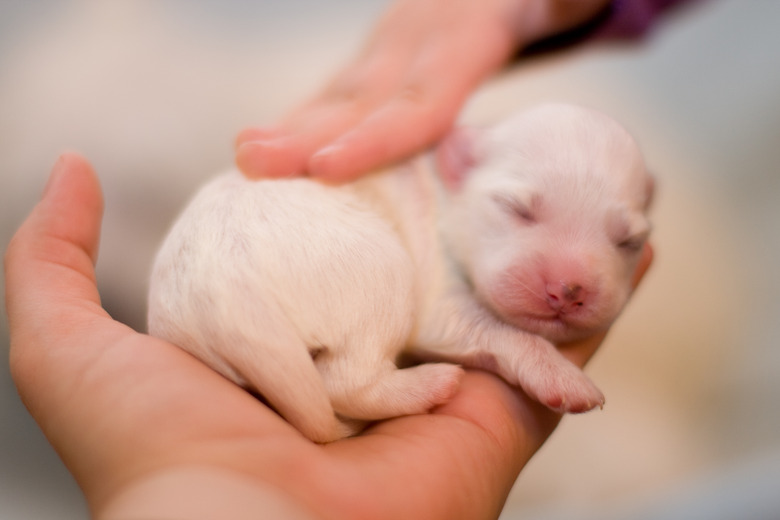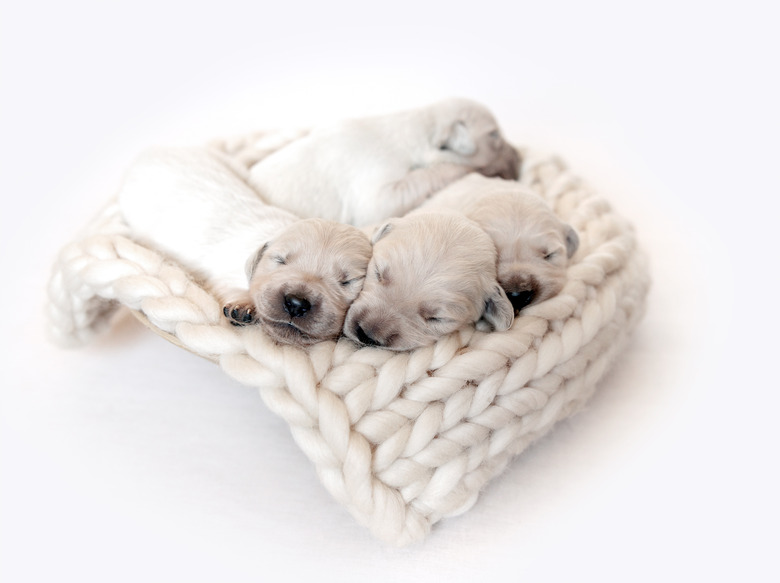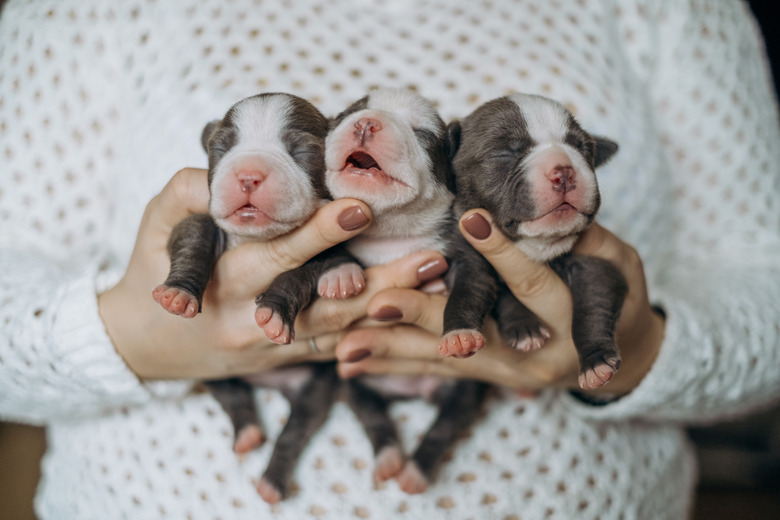Eyesight Development In Newborn Puppies
There's nothing cuter than watching a newborn puppy learn to explore the world with their eyes closed. If you've ever raised a litter of newborn puppies before, you know the thrill of seeing them open their eyes for the first time. We spoke with Dr. Ingrid Taylor, a veterinarian with 16 years of experience in general clinical and emergency practice and public health about the different stages of eyesight development. Puppy eyesight is fascinating, and knowing how it develops will help you to better understand what's going on as a litter ages.
Newborn puppies eyesight at birth
Newborn puppies eyesight at birth
Puppies are born blind and with their eyes closed. Their eyes are not fully formed when they are born, and exposure to bright light immediately after birth could damage a puppy's eyes, so their eyelids are tightly closed at birth. The eyelids protect their eyes from being damaged by dirt, scratched by their littermates as they clamber all over each other, or other foreign objects, giving them time to fully develop before being exposed.
When do a newborn puppy's eyes open?
When do a newborn puppy's eyes open?
Once puppies are 10 to 14 days old, their eyelids will open. The puppy's eyeball is still immature at this point and will have a blueish-gray color. The cornea will appear cloudy when a puppy first opens their eyes, but the cloudiness will begin to clear in around 24 hours.
Puppies can see only movement and shapes when they first open their eyes. This poorer vision will continue for about the first 3 weeks of a puppy's life before it begins improving as the newborn puppy's development continues and the eyes mature.
When are a newborn puppy's eyes fully developed?
When are a newborn puppy's eyes fully developed?
Most puppies' eyes will have fully developed by the time the puppies are 8 weeks old. Different breeds take longer to mature, and puppy eye development is slower. By 8 weeks of age, the cornea will appear clear, and the iris will have assumed its true coloration. After a puppy's first 8 weeks of life, their vision will have dramatically improved and should be as accurate as an adult dog's vision.
Assessing vision for your puppy
Assessing vision for your puppy
Once a puppy has open eyes, there a few ways you can assess their vision. For example, you can try testing your puppy's vision by silently tossing a cotton ball into the air. Be sure that you don't make any sound since this could catch the puppy's attention and skew the results of the test. The puppy should watch your hand motion and follow the path of the cotton ball up into the air and then down onto the floor.
If an older puppy doesn't follow the motion, seems to be using their sense of smell instead of eyesight, or only seems to see the cotton ball out of one eye, it may be time for veterinary care. Give them a vision exam with a veterinarian to look for potential problems. Additional indications your puppy might be having vision problems are if they are bumping into things, having trouble navigating new places, or having difficulty locating food or toys.
"If you have any questions about whether your puppy has vision problems or eye problems, even if they pass the cotton ball test, it's best to bring them to your veterinarian for professional diagnosis," says Dr. Taylor. "Your pup's eye health should be regularly assessed at their physical checkups to ensure everything looks healthy and is developing correctly."
Common eye problems in puppies
Common eye problems in puppies
Hopefully, your puppies will all experience normal eyesight development, but experienced puppy dog owners know that sometimes, things can go wrong. Puppies can have eye infections even before their eyelids open. You may see that the puppy's eyelid is swollen, or there may be discharge leaking out of the eyelids. In this case, take the puppy to the veterinarian for treatment. The puppy's eyelids may need to be opened to clear out the infection, and your veterinarian may recommend that you use an antibiotic ointment specifically for dog eyes.
Puppies can also experience eye trauma, especially if they're roughhousing with other dogs or if they're playing and run into something. "Common issues that may also affect eyesight in puppies include bacterial or viral infections, allergies, and inadequate tear production which is called dry eye," explains Dr. Taylor. "Entropion is a condition where eyelids turn inwards, which can cause eyelashes to press into the eye.
"Entropian can be brought on by minimal trauma to the head in these dogs, and even scruffing can cause it, so it is important to always handle dogs gently," Dr. Taylor continues. "If it happens, it is an immediate emergency."
Protrusion of the third eyelid, called a cherry eye, may affect visibility and cause irritation. Entropion can lead to corneal ulcerations if left untreated."
If your new puppy is experiencing any of these maladies, they may squint, hold their eye closed, or have discharge coming from the eye. "Puppies may rub their eyes or paw at their face if their eyes are painful or irritated," says Dr. Taylor.
Entropion can cause pain and light sensitivity, frequent blinking, discharge from the eyes, or squinting. When these problems are caught and quickly treated by a vet, they often fully resolve. However, issues like entropion and cherry eye often require surgical correction, Dr. Taylor notes.
Trauma can lead to injury or swelling of the conjunctiva, or tissues around the eye, or scratches or ulcers on the cornea. Severe trauma can lead to damage to the eyeball or internal structures of the eye. Small dog breeds, especially snub-nosed dogs, are prone to proptosis, where the eyeball pops out of the eye socket. In fact, any eye trauma warrants an immediate trip to your puppy's veterinarian.
There are also a few congenital issues that can affect your new puppy's eyes. Some puppies can be born missing an eye or with a very small eye. Other defects include choroidal hypoplasia (a condition where a layer of the eye is underdeveloped, commonly seen in collies, notes Dr. Taylor), a detached retina, and even juvenile cataracts. Each of these issues is quite serious, and veterinary pet care is necessary.
The bottom line
The bottom line
The eyes are particularly sensitive and vulnerable parts of a puppy's body, and any eye issue should be treated as serious. Your pup's eye health should be regularly assessed as part of their normal pet care at their physical checkups to ensure everything looks healthy and is developing correctly. Call your veterinarian right away if you notice a potential problem with your puppy's eyes or eyesight.The sooner you treat an eye issue, the better the outcome will be.


